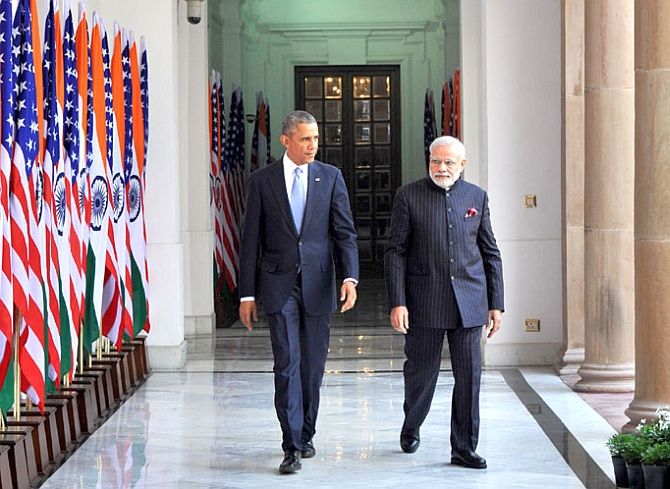We will find out over time whether the net gain of US President Barack Obama’s visit to India is positive or negative for both countries, says South Asia expert Professor Stephen P Cohen in conversation with Aziz Haniffa / Rediff.com.
Professor Stephen P Cohen, considered the doyen of American experts on South Asia, believes that for all the euphoria of last month’s Obama-Modi summit in New Delhi, is yet another new chapter in scores of chapters written in a book still to be published.
Cohen, Senior Fellow in Foreign Policy Studies at the Brookings Institution and emeritus professor of the University of Illinois at Urbana-Champaign, told rediff.com in an interview, “I am not persuaded by the euphoria of the Obama visit.”
“My view is that this is a new chapter, but in a book that might have 50 or 100 chapters and we don’t know what part it is in,” he said, and added, “We don’t know whether it’s the beginning of the book or the end of the book.”
Cohen, who has authored, co-authored or edited at least 12 books on India, Pakistan and South Asia, said with result to the much ballyhooed ‘breakthroughs’ in operationalizing the Indo-US civilian nuclear deal that has been in limbo for the past six years and cooperation in defence and the transfer of technology and Indo-US co-production, “I believe that in all these cases, we will find out over time whether the net gain is positive or negative for both countries.”
He warned, “I could see some of these not strengthening India but provoking neighbours; I could see it not having any impact whatsoever,” besides provoking the ire of the likes of China and Pakistan. “So, in a sense, you have to wait and see the results of these big events.”
Obama, in an interview with CNN’s Fareed Zakaria on his last day in New Delhi, said: ‘I was surprised when I heard the Chinese government had put out these statements. China doesn’t need to be threatened because we have good relations with India.”
Beijing had cautioned India from falling into a trap of rivalry being set by the West led by the US vis-s-vis its ‘pivot to Asia’ strategy, which it warned was a ploy to counter China’s rise.
But Obama argued that ‘my belief is that in this moment in history, there is an opportunity to create a win-win formula in which all countries are abiding by a common set of rules and standards and we are focused on lifting up prosperity for our people, not at the expense of others, but together with each other.’
Cohen, who served in the Reagan administration’s Policy Planning Council in the mid-1980s, told rediff.com, “The euphoria may be good where bilateral relations are concerned, but the strategic pay off -- as Bob Blackwill (former US Ambassador to India, ex-senior National Security Council official and now with the Council on Foreign Relations) has said -- could be rather modest.”
“So, we don’t know -- we still don’t know -- what the payoff for India and America will be,” he reiterated.
Cohen said specifically with regard to the breakthrough announced no the nuclear deal, since India is not budging on the nuclear liability law passed by Parliament, “The companies will have to decide themselves whether it is worth the risk and if their technology is as good as they claim it to be -- then they may be willing perhaps to take a greater risk -- although they are clearly worried by the echoes of the Bhopal decision.”
Asked for his overall take of the visit with all of the symbolism and the visual images with some substance thrown in for a good measure, he acknowledged that “the whole affair with strategic success -- when they reached an agreement on the nuclear issue, which was blocking everything else -- when that happened, the pageantry could go forward. The defence conversation could go forward.”
But, Cohen argued that “the defence agreement may take decades to complete -- it is a long-term prospect.”
“Mostly, a lot of it has to do with Indian reforms; a lot of it has to do with the Indian bureaucracy.”
But he predicted that “appointing a new defence minister and having a new American defence secretary (Ash Carter) could open up this relationship, but we have to see how successful both of them are in the new bureaucracies.”
To the contention in some quarters that Pakistan did not figure in the discussions at the Obama-Modi summit, but that Obama on his return has sent Congress a budget with an economic and security largesse to Islamabad, and the counterargument by others that why Pakistan should figure at all when the India-US relationship has moved beyond perpetuating the old zero-sum mindset obsession, Cohen said Pakistan not only figures in such discussions with regard to terrorism.
“Both countries talked about Pakistan in the sense that both countries talked about terrorism -- the implication of Pakistan being the major source of this. But I don’t know if privately they talked about Pakistan.”
Cohen said, “My guess is that the Americans don’t have a theory on South Asia -- they have an Indian policy, they have a Pakistan policy,” and added facetiously, and the two don’t seem to be done by the same government.”
He argued, “We have bifurcated our policy and when we stopped pressing on Kashmir -- which is probably a good thing -- we never had a theory or framework to put both India and Pakistan in.”
Cohen said, “I personally think it now would have to be regarding Afghanistan. But nobody in the administration seems to agree with that.”
He quipped that “the major accomplishment by all of this is that (till last month, India’s Ambassador to the US, Subrahmanyam) Jaishankar has been made foreign secretary.”
Cohen said, “Our loss is India’s gain -- he was very effective here and we will see what he will do as foreign secretary.”











 © 2025
© 2025